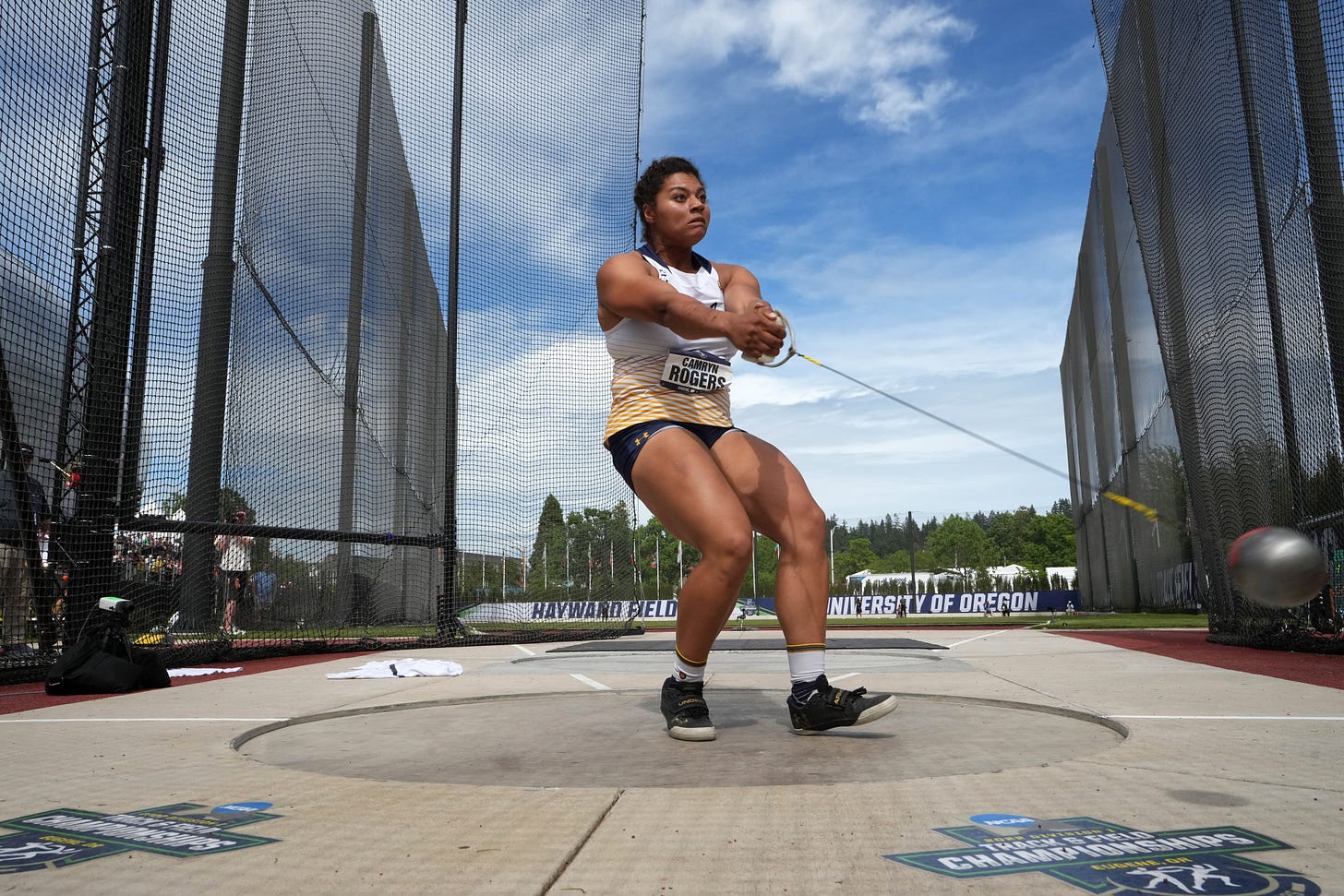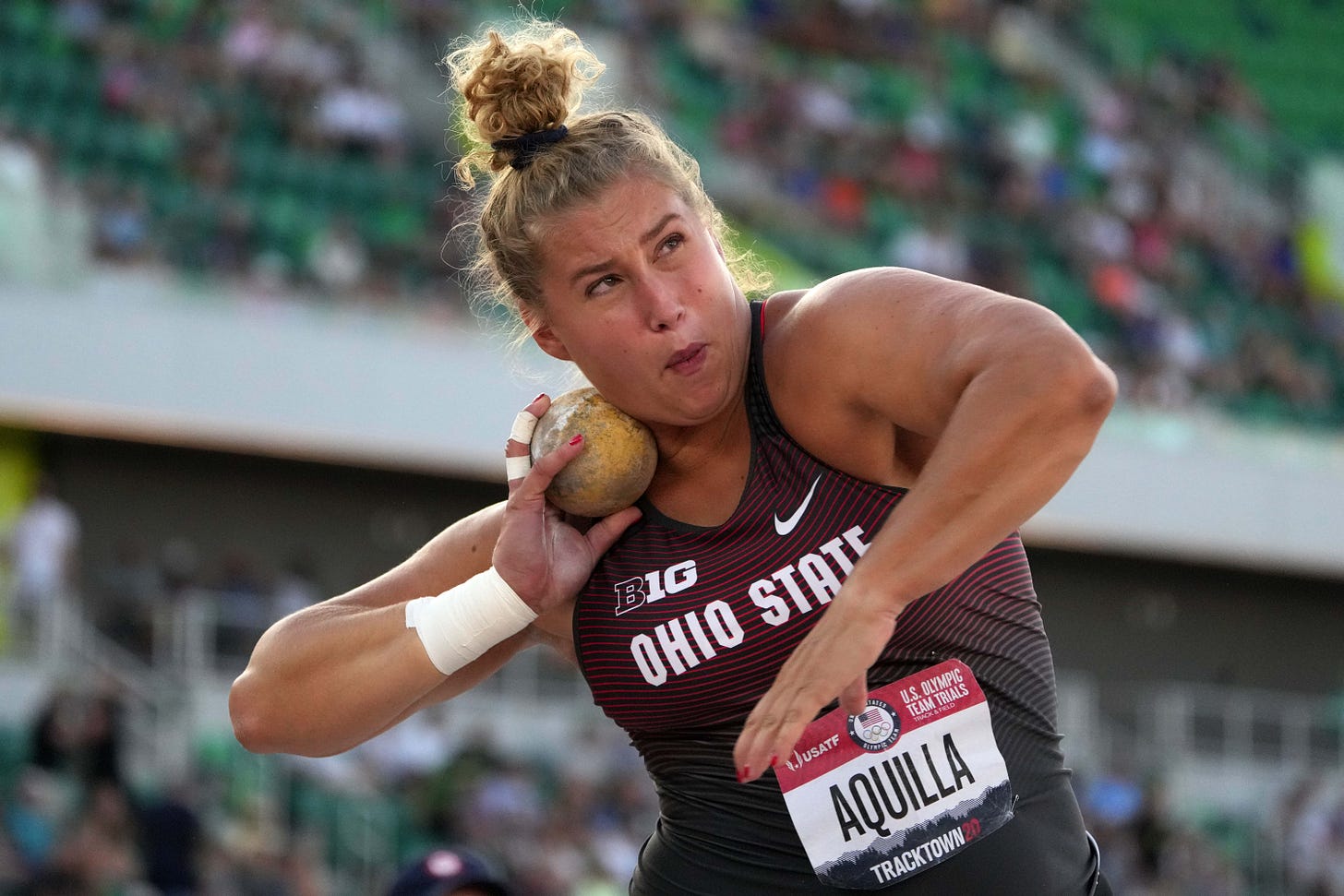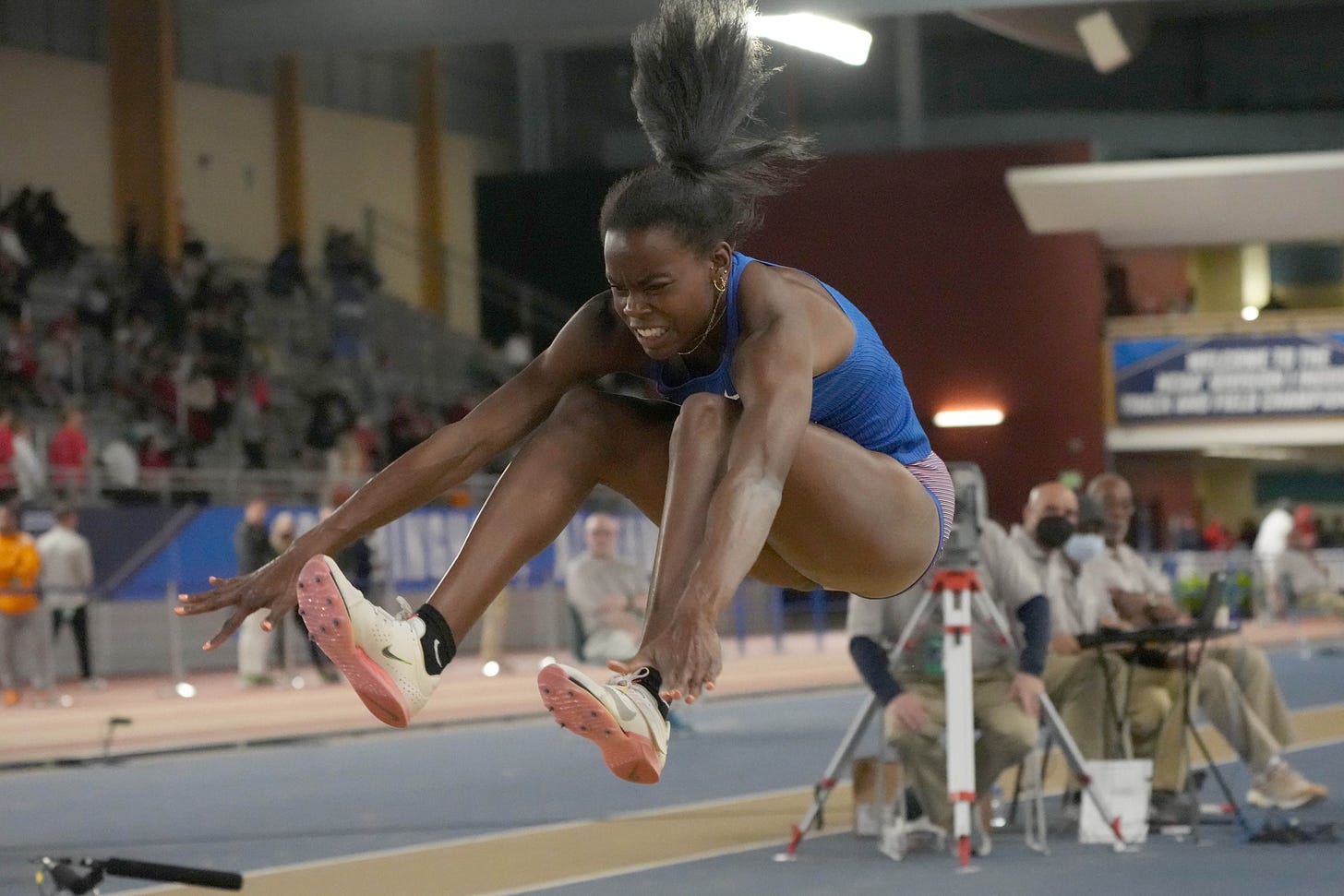Collegiate records cap standout careers
Rogers and Aquilla set all-time college bests in women's hammer throw and shot put

Seniors Camryn Rogers of UC Berkeley and Adelaide Aquilla of Ohio State ended their college careers with a bang on Thursday by setting collegiate records in the women’s hammer throw and shot put, respectively, in the NCAA track and field championships at the University of Oregon’s Hayward Field.
Rogers cemented her status as one of the greatest throwers in collegiate history when she set her third collegiate record of the season – and fifth of her career – with a toss of 77.67 meters (254 feet 10 inches). It was the third consecutive title in the hammer throw for the Canadian who placed fifth in the Olympic Games in Tokyo last summer.
Aquilla, a member of the U.S. Olympic team last year, won her second consecutive title in the shot with a put of 19.64 (64-5¼) that broke the previous collegiate record of 19.46 (63-10¼) set by Maggie Ewen of Arizona State in 2018.
Rogers, who turned 23 on Tuesday, had the greatest series of her career, capped by her fifth-round effort that shattered the previous collegiate – and Canadian – best of 76.46 (250-10) she set in the West Preliminary meet at the University of Arkansas on May 26. It also moved her to ninth on the all-time world performer list.
With the win, she became the second athlete to win three consecutive NCAA titles in the women’s hammer throw. The first was Frenchwoman Florence Ezeh, who won a trio of titles for SMU from 1999-2001.
“It’s incredible,” Rogers said. “Coach Mo (Saatara) and I have been working toward this. It goes further back than just this year, it’s something that every training session, every moment, everything over these last five years has been working toward. Capping off my collegiate season with such a competition feels just incredible.”
Rogers never trailed during the competition in which the top six finishers recorded personal bests.
Alyssa Wilson of Texas State, a transfer from UCLA, placed second with a best of 74.78 (245-4) to move to second on the all-time collegiate performer list, followed by fellow senior Beatrice Llano of Arizona State, whose 72.10 (236-6) effort solidified her hold on ninth on the all-time list.
For good measure, sophomore Sara Killinen of Virginia Tech finished fourth at 71.02 (233-0) to move to 13th on the all-time collegiate list.
Rogers threw 74.90 (245-9) on her first effort, and followed that with throws of 75.11 (246-5), 74.69 (245-0), and 74.92 (245-9) before unleashing her collegiate record of 77.67 (254-10) in the fifth round. She completed the competition with a throw of 75.91 (249-0) for a six-throw average of 75.53 (247-9).
“I was a little bit surprised,’ Rogers said of her record throw. “I watched it land and I immediately heard my whole family just screaming, so that’s when I knew. When the mark came up… oh my gosh. I was so excited, and I think generally when I’m throwing I keep my face pretty focused, but I was just so excited I immediately had to throw my hands up to my mouth. It was almost overwhelming. Such a special moment.”
Saatara, who is his ninth season as the throws coach at Cal, wrote in a text that he and Rogers had planned for a “very strong series. There were very strong and great competitive throwers in the field so we expected a throw in the range of 76-78m. For that we needed an average competition throw of 75m. There was a lot of good energy in the meet and Camryn is great at rising to the challenge. It was a great day.”
To appreciate how great her performance was, consider that Rogers, who set a pair of collegiate records in winning the NCAA title last year, entered the meet with the five longest throws in collegiate history and ended it with the 10 best and 11 of the top 12.
Aquilla, who also won the last two NCAA indoor titles in the women’s shot put, broke the collegiate record in the first round when her 19.64 (64-5¼) effort crushed her previous personal best of 19.12 (62-8¾) from last year.
She also had puts of 19.06 (62-6½), 18.68 (61-3½), and 18.67 (61-3).
Senior Jorinde Van Klinken of Arizona State and the Netherlands finished second with a best of 18.58 (60-11½).

The second day of the decathlon was the only men’s event contested on Thursday and it was an exciting affair in which Ayden Owens-Delerme of Arkansas totaled 8,457 points to finish ahead of runner-up Leo Neugebauer of Texas (8,362) and third-place Kyle Garland of Georgia (8,333).
Owens-Delerme, the runner-up in last year’s meet for Michigan, had totaled a then-collegiate record of 8,528 points in winning the Mt. San Antonio College Relays in April.
Although he fell short of that score Thursday, he was dealing with an injury issue that seemed particularly bothersome to him during the long jump and high jump on Wednesday.
After beginning the second day with a 49-point lead over Garland and a 55-point lead over Neugebauer, he ran 13.93 seconds in the 110-meter high hurdles, and followed that with efforts of 46.25 (151-9) in the discus, and 4.51 (14-9½) in the pole vault.
He trailed Neugebauer by 33 points after the pole vault, but picked up 44 points on his rival in the javelin when he threw a personal best of 56.07 (183-11). He then ran 4:29.54 in the 1,500 with Garland at 4:41.96 and Neugebauer at 4:42.68.
I’m just happy I was able to fight through some of the pain I was dealing with, and come out there and become a national champion,” Owens-Delerme told letsrun.com.
Neugebauer added 231 points to his previous personal best of 8,131 he set in winning the Texas Relays in March. The German also moved to eighth on the all-time collegiate performer list and exceeded the qualifying standard of 8,350 points for the World Championships that will be held at Hayward Field from July 15-24.
Garland totaled the second-best score of his career after raising the collegiate record to 8,720 points in finishing second in the USA Track & Field Combined Events Championships that were held from May 6-7.
Arizona State led the women’s team standings with 18 points at the end of the day on Thursday, followed by Florida, Nebraska, and Virginia Tech with 14 points each.
However, Texas and Florida appear to be the two teams that will be best positioned for a team title run on Saturday when the women’s meet will conclude.
Jasmine Moore and Claire Bryant accounted for Florida’s 14 points on Thursday when they finished first and fifth in the long jump with marks of 6.72 (22-0¾) and 6.51 (21-4¼).

Texas is expected to score its points in the sprints, relays, high jump and triple jump. It advanced two athletes to the finals of the 100, 200, and 400. It also posted the fastest qualifying time in the 400 relay at 42.34 and was the fourth-fastest qualifying team in the 1,600 relay with a time of 3 minutes 27.88 seconds.
The Longhorns’ Julien Alfred was one of two sprinters to post the top qualifying time of 10.90 in the 100, and teammates Stacey Ann Williams and Kennedy Simon were the second- and third-fastest qualifiers in the 400 with times of 50.18 and 50.45.
In addition, Kynnedy Flannel and Kevona Davis were the No. 3 and 5 qualifiers in the 200 with times of 22.25 and 22.38.
Tyra Gittens is expected to contend for the high jump title for Texas and teammate Ackelia Smith should be among the top finishers in the triple jump.
Florida will be looking to score points in the 400, 800, 400 hurdles, 1,600 relay, triple jump, and heptathlon on Saturday.
Anna Hall could be a key performer for the Gators as she is heavily favored in the heptathlon, ranked second in the 400 hurdles, and could run a leg in the 1,600 relay.
The final of the 400 hurdles is scheduled for 3:57 p.m., Pacific time, with the heptathlon 800 meters starting at 4:13. The 1,600 relay is scheduled to start at 4:51.
Talitha Diggs, Imogen Barrett, and Moore are also expected to play prominent roles for Florida.
Diggs had the fastest semifinal time in the 400 at 50.08, Barrett was the third-fastest qualifier in the 800 at 2:02.24, and Moore is expected to finish high in the triple jump.
Kentucky, led by sprinter Abby Steiner, could contend for the women’s team title if Texas and Florida falter.
Steiner ran a personal best of 10.90 in the 100 and her career best of 22.02 in the 200 tied the meet record. She will also run for Wildcat teams that had the second-fastest qualifying time in the 400 relay at 42.53 and set a collegiate record of 3:21.93 in the 1,600 relay in the Southeastern Conference Championships on May 12.
In other finals on Thursday, Mercy Chelangat of Alabama won the women’s 10,000 in 32:37.08, Gabriela Leon of Louisville placed first in the pole vault at 4.60 (15-1), and Ashton Riner of BYU won the javelin with a throw of 58.24 (191-1).
The meet will start at 1 p.m., Pacific time, on Friday with the heptathlon 100-meter hurdles.
The final day of the men’s competition will start with the high jump at 5:30 p.m. The first track event, the 400 relay, is scheduled for 6:02.



